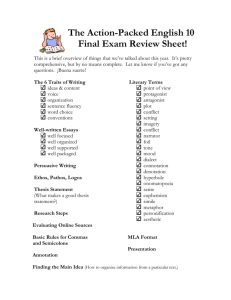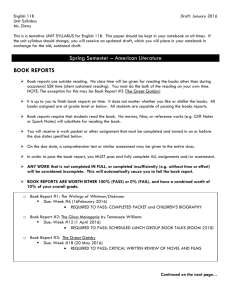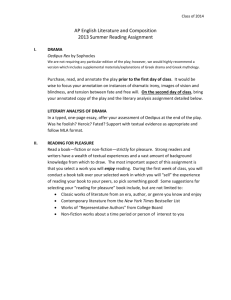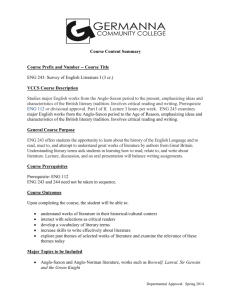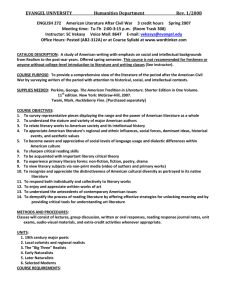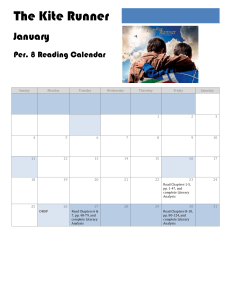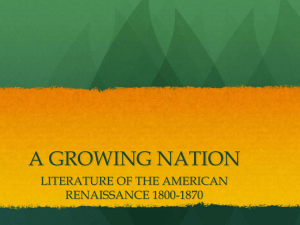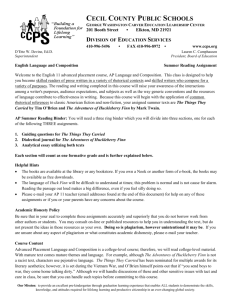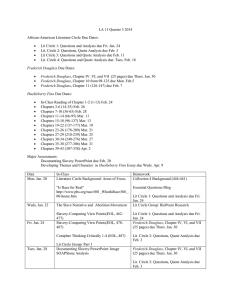American Literature Since 1865 University of Central Oklahoma
advertisement
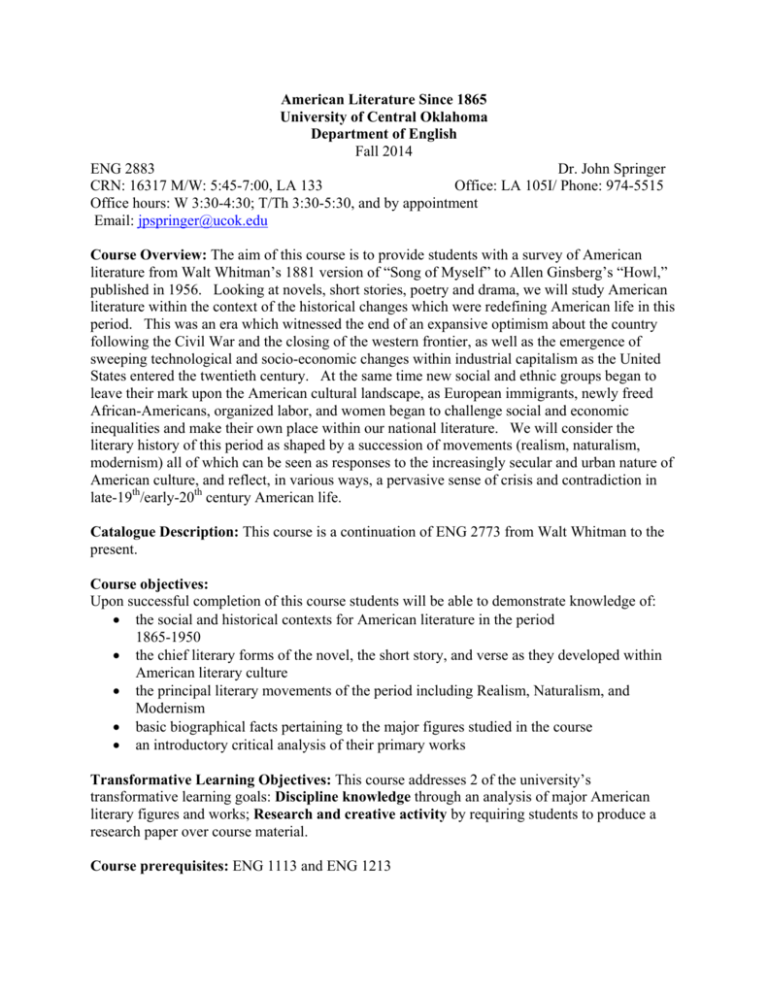
American Literature Since 1865 University of Central Oklahoma Department of English Fall 2014 ENG 2883 Dr. John Springer CRN: 16317 M/W: 5:45-7:00, LA 133 Office: LA 105I/ Phone: 974-5515 Office hours: W 3:30-4:30; T/Th 3:30-5:30, and by appointment Email: jpspringer@ucok.edu Course Overview: The aim of this course is to provide students with a survey of American literature from Walt Whitman’s 1881 version of “Song of Myself” to Allen Ginsberg’s “Howl,” published in 1956. Looking at novels, short stories, poetry and drama, we will study American literature within the context of the historical changes which were redefining American life in this period. This was an era which witnessed the end of an expansive optimism about the country following the Civil War and the closing of the western frontier, as well as the emergence of sweeping technological and socio-economic changes within industrial capitalism as the United States entered the twentieth century. At the same time new social and ethnic groups began to leave their mark upon the American cultural landscape, as European immigrants, newly freed African-Americans, organized labor, and women began to challenge social and economic inequalities and make their own place within our national literature. We will consider the literary history of this period as shaped by a succession of movements (realism, naturalism, modernism) all of which can be seen as responses to the increasingly secular and urban nature of American culture, and reflect, in various ways, a pervasive sense of crisis and contradiction in late-19th/early-20th century American life. Catalogue Description: This course is a continuation of ENG 2773 from Walt Whitman to the present. Course objectives: Upon successful completion of this course students will be able to demonstrate knowledge of: the social and historical contexts for American literature in the period 1865-1950 the chief literary forms of the novel, the short story, and verse as they developed within American literary culture the principal literary movements of the period including Realism, Naturalism, and Modernism basic biographical facts pertaining to the major figures studied in the course an introductory critical analysis of their primary works Transformative Learning Objectives: This course addresses 2 of the university’s transformative learning goals: Discipline knowledge through an analysis of major American literary figures and works; Research and creative activity by requiring students to produce a research paper over course material. Course prerequisites: ENG 1113 and ENG 1213 Required Text: The Norton Anthology of American Literature, seventh edition (Volumes C, D, E) Evaluation: The course will be based on lectures, assigned readings, and class discussions. Evaluation will be based on the following: % of grade Quizzes 25% Midterm Exam 25% Final Exam 25% Analytical Paper 25% Requirements: 1. Participation. Participation includes class attendance and class discussion. A student’s final grade will be lowered one grade at the fourth unexcused absence; two grades at the sixth unexcused absence; three grades at the eighth unexcused absence. If a student misses 30% of a class (9 classes), the student will automatically fail the course. Excused absences must be accompanied by written documentation that should be turned in on the day the student returns to class following the absence. I will not accept documentation for absences after course work has ended. All students are encouraged to participate in class by asking questions, responding to discussion prompts, and raising their own discussion topics. 2. Examinations. The mid-term and final will be essay examinations. The exams will consist of one short answer (approx. 150 words) and one long answer (350-500 words). There will be a choice of essay questions to write on. 3. Quizzes. There will be quizzes given throughout the semester. These will each consist of 10 multiple choice questions covering the lectures and reading assignments. You will need short green Scantron sheets for each quiz (available in the bookstore). 4. Analytic Paper. The paper will be 5-7 pages in length, typed, 12 point font, 1” margins, double-spaced. Follow MLA guidelines. This is not a research paper. You are to choose some aspect of a work that you are interested in and then analyze the text. Make an assertion and then support that assertion with textual evidence. Be sure to document historical evidence and arguments/ideas from other critics. Do not write a plot summary. Do not write a biography. Plagiarism will result in an automatic failure on the assignment. 5. Make-up Policy. The Mid-term may be made up by making arrangements with me. However, it must be made up within one week of the exam date. The Final exam may not be made up. On Quiz days, the first 10 minutes of class will be devoted to taking the quiz. If you arrive more than 10 minutes late to class, you may not make up the quiz. Syllabus August 18: Course Introduction Read: Walt Whitman, “Song of Myself” (1881): stanzas 1-30 20: Read “Song of Myself” stanzas 31-52 25: Read: Emily Dickinson, 49, 67, 185, 199, 241, 249, 258, 280, 341, 435, 441, 449, 465, 632, 712, 986, 1129, 1624, 1732 27: Read: Mark Twain, Huckleberry Finn: chapters 1-11 September: 1: Labor Day/ No class Read: Huckleberry Finn chapters 12-23 3: 8: Huckleberry Finn Read: chapters 24-31 10: Read: 32-“Chapter the Last” 15: Read: Ambrose Bierce, “An Occurrence at Owl Creek Bridge,” pp. 360-366 17: Read: Ambrose Bierce: “Chickamauga,” pp. 366-370 Read: Kate Chopin, The Awakening: chapters 1-16 22: Read: The Awakening: chapters 17-39 24: Realism and Local Color Read: Hamlin Garland, “Under the Lion’s Paw,” pp. 753-762 29: Read: Charlotte Perkins Gilman, “The Yellow Wall-paper” and “Why I Wrote “The Yellow Wall-paper” pp. 808-820 October 1: Naturalism Read: Stephen Crane, “The Open Boat,” pp. 1000-1016 6: Read: Theodore Dreiser, “True Art Speaks Plainly,” pp. 926 8: Read: Jack London, “To Build a Fire,” pp. 1057-1067 13: Mid-term exam Read: Robert Frost, “Mending Wall,” “The Road Not Taken,” “Stopping by Woods on a Snowy Evening;” 15: 20: 22: Modernism 27: Read: F. Scott Fitzgerald, “Babylon Revisited,” pp. 1839-1853 29: Read: Ernest Hemingway, “The Snows of Kilimanjaro,” pp. 1983-1999 November 3: 5: Read: Langston Hughes, “Weary Blues,” “The Negro Speaks of Rivers,” “Mother to Son,” “I, Too,” “Song for a Dark Girl,” “Vagabonds,” “Refugee in America,” “Visitors to the Black Belt,” “Democracy,” “Words Like Freedom” 10: 12: Read: Richard Wright, “The Man Who was Almost a Man,” pp. 2067-2075 17: 29: Read: Arthur Miller, Death of a Salesman, pp. 2327-2392 24: 26: Thanksgiving Break—No Class December 1: Read: Allen Ginsberg, “Howl,” pp. 2576-2583 3: Last Day of Class 10: Final Exam @ 5:30 Regents’ Statement: “It is expected that a full-time college student will spend a minimum amount of time each week in class attendance and study out of class approaching a 40-hour work week. A person employed on a full time basis should not simultaneously expect to maintain a full-time academic schedule. At the undergraduate level, this means that for each hour in class, a student is expected to spend at least three (3) hours doing homework. For a three credit class, a student is expected to spend nine (9) hours a week doing homework. Additional information about University policies may be referenced through the following url: http://www.uco.edu/academic‐affairs/files/aa‐forms/StudentInfoSheet.pdf
